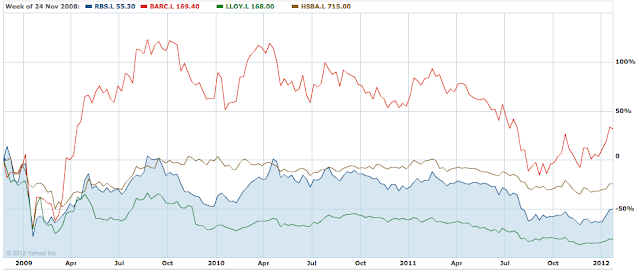A suitcase full of money went through the window yesterday. One million pound, just thrown away. There is no finder and no one will directly benefit from it, nor will the man with the dynamic arm miss his loss much – it's peanuts on either side. But the surrounding story is nevertheless quite intriguing.
Late in 2008, the Royal Bank of Scotland was bailed out by the British government when it ran out of cash as a result of the wildly testosterone-fueled and ultimately doomed takeover of the Dutch bank ABN Amro. Stephen Hester took charge as chief executive on a contract negotiated between him and the new owners, the government.
Last week, it became known that Mr. Hester was expecting a bonus payment of nearly one million pound, and the outrage was nearly universal. How can he, in times of austerity, when the economy is double-dipping and regular workers see their real income decline, take a dip in the warm pool of gratuitous luxury?
The outrage was predictable; the story fits too well with the established greedy-banker-narrative. But as I see it, Mr Hester is entitled to his bonus. He negotiated a contract with a company that was quite eager to have him aboard and got a generous pay package. If I were in the situation, I'd bargain for the best deal possible, too. In any negotiation, in fact, I'd bargain for the best deal. Everyone would, and those who wouldn't, should.
The blame for the bonus, if it is unjustified, doesn't lie with the employee taking it but with the employer handing it out. The employer in this case is the government, at least indirectly. But even though David Cameron, the Prime Minister, argues against million-pound bonuses at state-owned banks, there was little he could do. The contracts had been signed.
The contracts were signed by the previous government, Labour. In an example of insuperable political hypocrisy, it's the voice of the current leader of Labour, Ed Milliband, that calls loudest on the government to withdraw the bonus. No apologies that Labour had dispensed the millions in the first place.
Labour, curiously for a nominally workers' party, has bought into the City's dictum that the financial industry needs the brightest minds. It is often argued, mostly from inside the financial sector, that outrageous pay packages simply reflect the difficulty of attracting top talent. That it hasn't worked out so well over the last decade is not part of that logic. That bright minds are needed just as much in the sciences and in engineering is conveniently ignored. But who will make the discoveries that will form the foundation of the country's prosperity? Who will build the bridges into the future?
Political posturing and lobbying is not surprising. What surprised me is that no one looked at the reasons behind the bonus. What justifies the bonus? In my naive way, I'd think a bonus is justified for exceptional results, for a performance beyond the call of duty. Measuring this is always difficult. But we're talking City of London here. Profitability, employment figures, the health of the balance sheet, and tangible benefits to society are only of secondary importance. What matters is the share price.

The graph above shows the development of the share price of RBS (blue, shaded) since the arrival of Mr Hester at the helm until last week, overlaid with corresponding graphs for the bank's direct competitors. In a bit more than three years, Mr Hester managed to destroy 50% of the value of RBS, which is better than what his counterpart at Lloyds Banking Group did (-80%) but not as good as the effort of the CEO of HSBC (-24%). Barclays plays in a different league (+32%). Credit to Yahoo (+36% over the same period, not adjusted for dollar-pound variations) for the numbers. Note that the two worst performers are cocky Scottish banks. On that evidence alone, support for the independence of Scotland with all the responsibilities this entails should be overwhelming in England.
In light of these numbers, it's hard to see how a performance bonus could be justified. But maybe it was a bonus just for showing up. This is becoming increasingly popular, as ridiculous as that sounds (unless you get it). Just today, unions negotiating on behalf of London Underground workers (ticket office staff and engineers, among them) rejected an offer of £500 per head for working during the Olympics – on top of the regular salary – as inadequate. Everyone else working in public transport has already got a better offer, goes the complaint.
Here, my story draws to a close. Maybe Mr Hester didn't want to associate with tube station staff and bus drivers. Maybe he didn't care about the million pounds one way or another and much preferred to get out of the media's cross hairs. In either case, he decided to decline the bonus and get on with it, though how long he'll stay at RBS is anyone's guess.

No comments:
Post a Comment